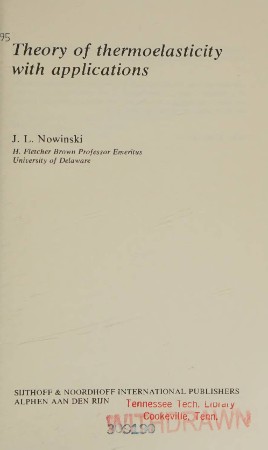Theory of thermoelasticity with applications - Nowinski

pdf | 90.14 MB | English| Isbn:9789400999312 | Author: J.L. Nowinski | Year: 2011
Description:
Although the theory of thermoelasticity has a long history, its foundations having been laid in the first half of the nineteenth century by Duhamel and Neumann, wide-spread interest in this field did not develop until the years subsequent to World War Two. There are good reasons for this sudden and continuing revival of interest. First, in the field of aeronautics, the high velocities of modern aircraft have been found to give rise to aerodynamic heating; in turn, this produces intense thermal stresses and, by lowering the elastic limit, reduces the strength of the aircraft structure. Secondly, in the nuclear field, the extremely high temperatures and temperature gradients originating in nuclear reactors influence their design and operation. Likewise, in the technology of modern propulsive systems, such as jet and rocket engines, the high temperatures associated with combustion processes are the origin of unwelcome thermal stresses. Similar phenomena are encountered in the technologies of space vehicles and missiles, in the mechanics of large steam turbines, and even in shipbuilding, where, strangely enough. ship fractures are often attributed to thermal stres ses of moderate intensities. The investigations of these, and similar, problems have brol!ght forth a remarkable number of research papers, both theoretical and experimental, in which various aspects of thermal stresses in engineering structures are described.